Giulia Giannini McGauran (G.G McG) for Rolling Stone
How Tones And I defied the laws of music industry ascent and is rising above long sufferers of Australia’s storied ‘tall poppy syndrome’.
Tones And I is smoking a cigarette backstage at Laneway Festival in Sydney. She puts it out, sweeps her long peach-blonde hair out of her face and motions for those around her to huddle in for a loose group hug. Her friends, Abbie and Kurt, along with her co-managers, reps from Sony Music and YouTube, and even me, are invited to join the inner circle.
“I’m so grateful that we’re all here,” she says, assertive and stylish in a pristine Nike tracksuit. “Because I was busking eight months ago.” She pulls away slightly, grinning widely before shouting, “group high five!”
The first half of this article appeared last week on Rolling Stone Australia. Read the second half here.
A highlight reel of Toni Watson’s last 14 months: “Johnny Run Away” her first single (and first song she ever wrote) went double platinum a few months after release in March 2019; “Dance Monkey” was released two months later and hit number one in 35 countries; the track spent six months at number one in Australia, beating the last record by 15 whole weeks.
She broke a UK chart record held by Rihanna (who had two number one UK singles before she took the title with “Umbrella” in 2007); she was gushed over by Elton John and Jimmy Fallon; she won four ARIA Awards, nabbed three spots in the triple j Hottest 100 and has accrued 2.2 million YouTube subscribers.
Unlike some previous female Australian pop exports – the ones who were either ‘discovered’ via a Hunger Games-esque televised talent show or were dismissed until America took them under their bald eagle wing – Tones And I’s trajectory was rather organic and homegrown.
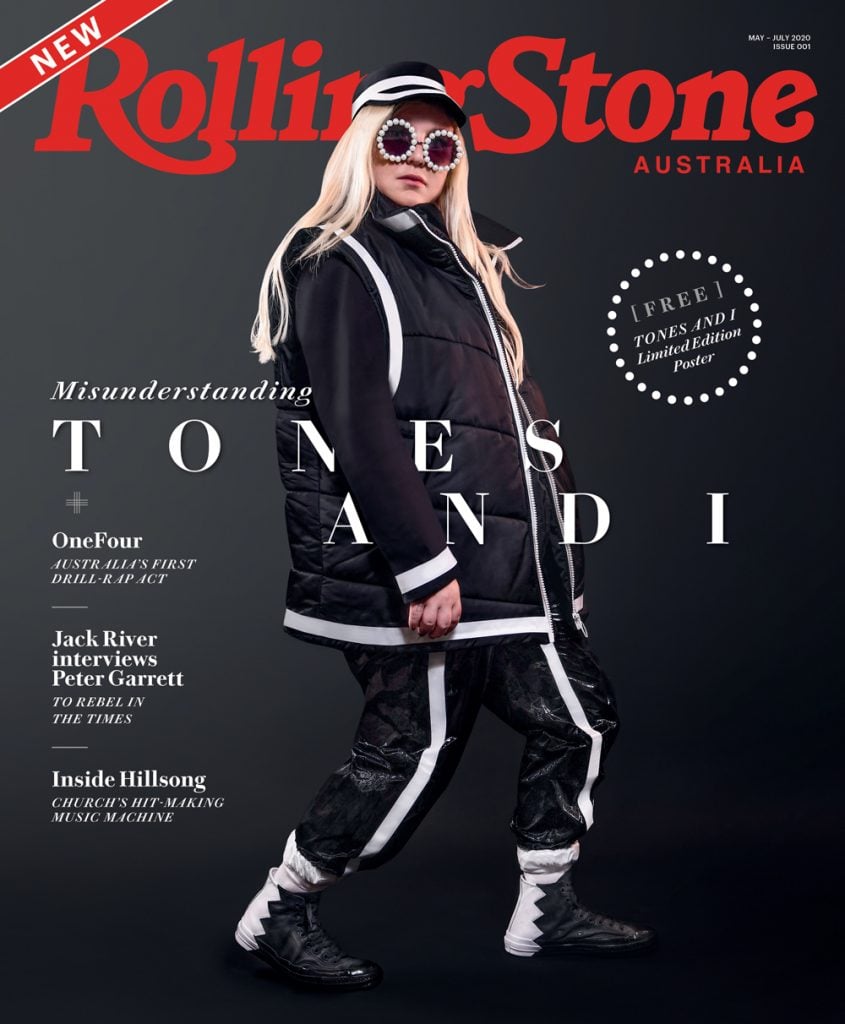
Tones And I graces the cover of the debut issue of ‘Rolling Stone Australia’. (Giulia Giannini McGauran (G.G McG) for Rolling Stone)
Tones moved from Melbourne’s Mornington Peninsula to Byron two years ago to busk. Taking annual leave from her retail job at Universal Store (before eventually resigning), Tones replaced one small seaside town with another and inked a management deal off the back of her first street performance.
Love Music?
Get your daily dose of everything happening in Australian/New Zealand music and globally.
As luck would have it, her now co-manager Jackson Walkden-Brown was headed to dinner with his wife when they stopped to watch Tones And I perform. As they stood in awe of Tones’ playful yet utterly confrontational operation – this was pre-“Dance Monkey”, mind you – they later skipped dessert to rush back and join the growing crowd. Walkden-Brown slipped his business card in with a tip and played the waiting game.
Tones had relocated back to Melbourne when Walkden-Brown asked her to move in with him and his family. His house in the Gold Coast Hinterland had a bush cabin off the back, and it was in its wardrobe where Tones wrote her global number one and second ever single, “Dance Monkey”.
Written after one particularly trying night out busking in Byron, Tones had been performing for six hours when one drunkard stole her money and another tried to play her keyboard. After telling the crowd she was done for the night, she was booed.
It wouldn’t be the last time a crowd would treat her like she was their property; a monkey created to entertain. During her first festival appearance at New Zealand’s Bay Dreams, a section of the crowd chanted “dance monkey, dance monkey” over and over, unwittingly feeding into the exact narrative the song was about.
Here is a song the whole world knows. Here is an artist whose backstory and marketing campaign was better than fiction: who was this Byron Bay busker with the powerful voice who was living out of her van just one short year ago?
At this point in her career, Tones and I had released just six songs, her festival sets include cover songs and unreleased tracks just to make time. Granted she is defined by the intoxicating electroclash of “Dance Monkey” to many, but is the trade-off that she should be goaded on and offstage?
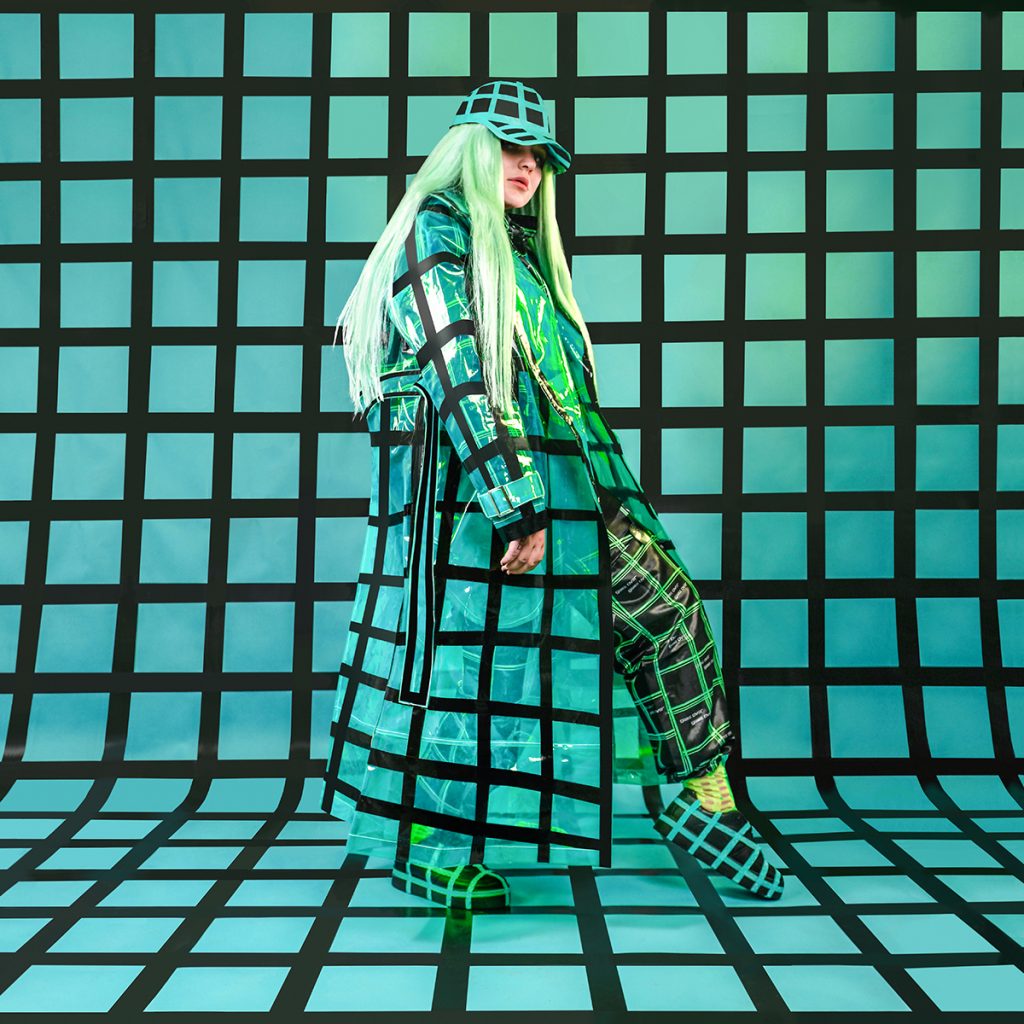
With a never-ending list of milestones to her name, Tones And I is one of Australia’s biggest exports of all-time. (Photo by Giulia Giannini McGauran (G.G McG) for Rolling Stone)
I’m in an Uber on my way to Toni Watson’s new home in Melbourne when her co-manager Regan Lethbridge texts me: “1b streams on Spotify today (1.7b overall streams). Have fun with Tones.” I arrive at the two-storey house half expecting a celebration. It’s lunchtime, so perhaps champagne is christening the carpet and maybe Tones is jumping on a couch like she once did with Lewis Capaldi backstage at France’s NRJ Awards.
Her assistant Abbie greets me with a hug at the door, she met Tones in September 2017 in Byron Bay and moved from the UK to take on the role. She’s more than that though, with a welcoming and effervescent energy I can see why anyone would want to keep her close.
The house has only recently been moved in to. It’s 40C outside and as sunshine splashes in from all angles, it’s a cool reprieve from the typical Australian summer heatwave. Abbie leads me through a loungeroom where at one end, a little girl – the daughter of another friend – is watching TV. At the other end of the room is a stack of framed, platinum record plaques; they’re crammed against one another on the floor.
Tones and a few of her friends are in the next loungeroom watching YouTube through a TV and trying out a Shakti Mat; not exactly the revelry I was expecting for such a milestone. For the uninitiated, think of a Shakti Mat as a 21st century bed of nails. Made of thin foam and over 6,000 tiny plastic spikes, it’s meant to relieve back pain, allergies, stress, and depression.
Tones is dressed in a black and pink tracksuit with a cap pulled low over her forehead. Though she’s been noticed in similar attire since she burst onto the scene last year, it’s not a character costume nor a gimmick, it’s an expression of freedom in a climate where pop stars can wear whatever the fuck they want.
Her cheeks are peaches and cream, her eyes are an oceanic blue, and she has the title of her co-produced EP The Kids Are Coming tattooed on her hand, along with an outline of an alien head. In conversation, she listens carefully and earnestly; she is softly spoken but flexes her South Melbourne accent from her formative years in suburban Mornington. Sitting across from me at an eight-seater table letting her Uber Eats order go cold, Tones is wiping tears from her eyes.
“I’m beating out all these American artists. An Australian female artist is beating out all these American artists and you guys make me want to leave the fucking country. Like, what are you doing to me? It’s not like I’m Trump. Shit, Trump gets more respect than this.”
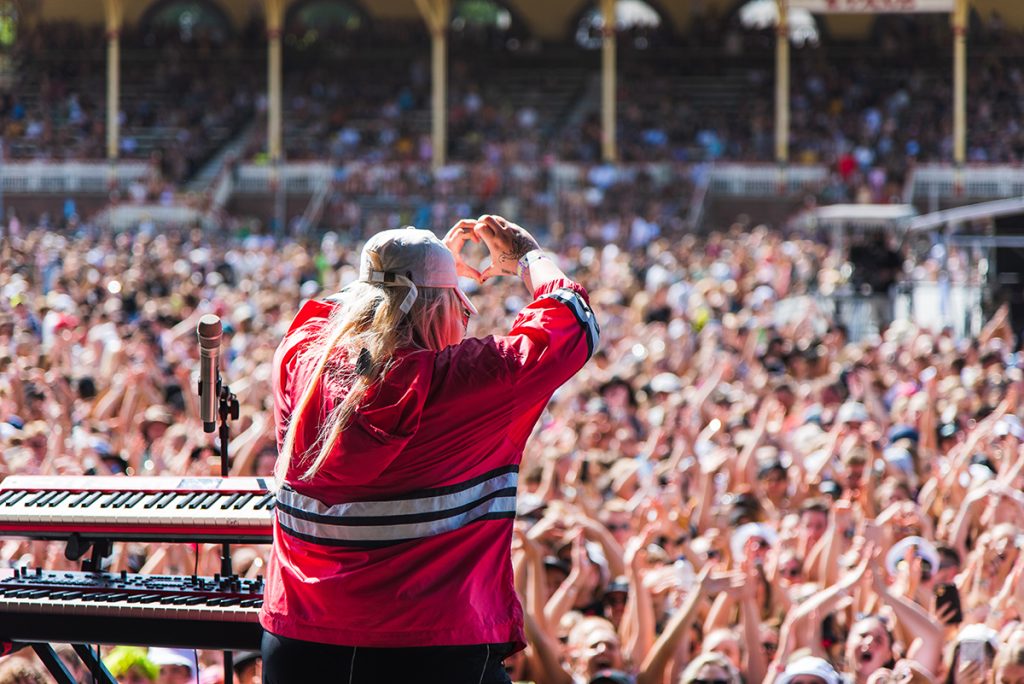
Tones And I performs in front of a packed Laneway Festival crowd. (Photo by Jack Neale)
I suspect the reason Tones hasn’t been adopted by lovers of quirky pop – the same fans who think Billie Eilish is here to save music and Lizzo is the second coming – is because of her fatal flaw. She’s Australian, and she dared not to earn her stripes as a battler on the national pub circuit; thus giving Australians no ownership of her success.
Instead, her songs did the travelling for her, picking up millions of fans across all four corners of the earth. Yes, you can be a great Australian pop export, but you best play the part. They want a star who says, ‘I am your creation and forever in your debt. Not only will I make earworms for your listening pleasure but I’ll make sure my success is hard-earned and say I could never have done it without you’.

“There’s a difference between negative opinions that don’t affect you, that are horrible – they don’t need to be said, but if you want to say it, that’s fine,” she allows. “But then there’s really digging in and pulling out my heart and soul, and just shoving it back in my face, and beating me over and over again until I’m sitting here crying in my own home.
“No one even understands how bad it really is,” she admits. “How much do we have to fucking push someone, does someone have to kill themselves?”
“How much do we have to fucking push someone, does someone have to kill themselves?”
Tones And I has had an outstandingly fast rise to fame. And while most artists slowly build up their thick skin, Tones has not been afforded that luxury. For her, the retaliation for her success has been dramatic. Haters and trolls have the loudest voice on social media, so while the streams and accolades keep piling in from across the world, so does the hate from long sufferers of Australia’s storied ‘tall poppy syndrome’.
In the early months of her ascent, Tones became a canvas for people to paint their own bias. Tones is an industry plant (false), Tones is 19 years old and lies about her age (false), Tones is 26 years old and lies about her age (false), Tones’ sound makes people turn off the radio (true for some, false for millions). But these are the comments she finds bemusing. The others – the graphic ones attacking her physicality and those threatening her life – are too vile to publish even in Rolling Stone.
Tones addresses her haters directly now: “I promise you everything that you say, I feel about myself now. I promise you that I feel like shit all the time, so leave me alone now because there’s nothing more you can do.”
At this point in her career Tones has lost agency of her narrative, she deserves to see herself but her view is clouded by the voices she hasn’t yet learnt to block out. If anything, the experience has sharpened her resilience.
Onstage at the ARIA Awards last November, she addressed the issue as she accepted the award for Best Female Artist. To a crowd of over 2,500 and another 417,000 watching at home, she said: “No one could have ever prepared me for the whole world judging me and comparing [me] to other artists.”
Sitting across from me now, she relaxes and beams a cheeky grin: “If I didn’t think about it before, I know now that I fucking deserve it because I decided to push through all this shit.”
“If I didn’t think about it before, I know now that I fucking deserve it because I decided to push through all this shit.”
Tones shows me a photo of Khalid leaning over her dressing room chair backstage at the ARIAs. She’s looking up at him as her makeup artist strips off the synthetic skin she wore when she reprised ‘Old Tones’ from the “Dance Monkey” video for her performance. The photograph was taken minutes before she went onstage to accept the Best Female Artist award.
“I had people on my hair, people peeling my face, I had my face latex hanging off on each side… And then someone comes in and goes, ‘Look, Khalid’s outside, he really wants to meet you’.” Tones breaks into a dry grin. “So he came in […] He didn’t even mention it.”
The pair exchanged numbers and soon after met for a three-hour lunch in Sydney. “I didn’t take a photo, I didn’t post about it. I just had a really good meeting, something that didn’t need to be shared and it was very genuine.”
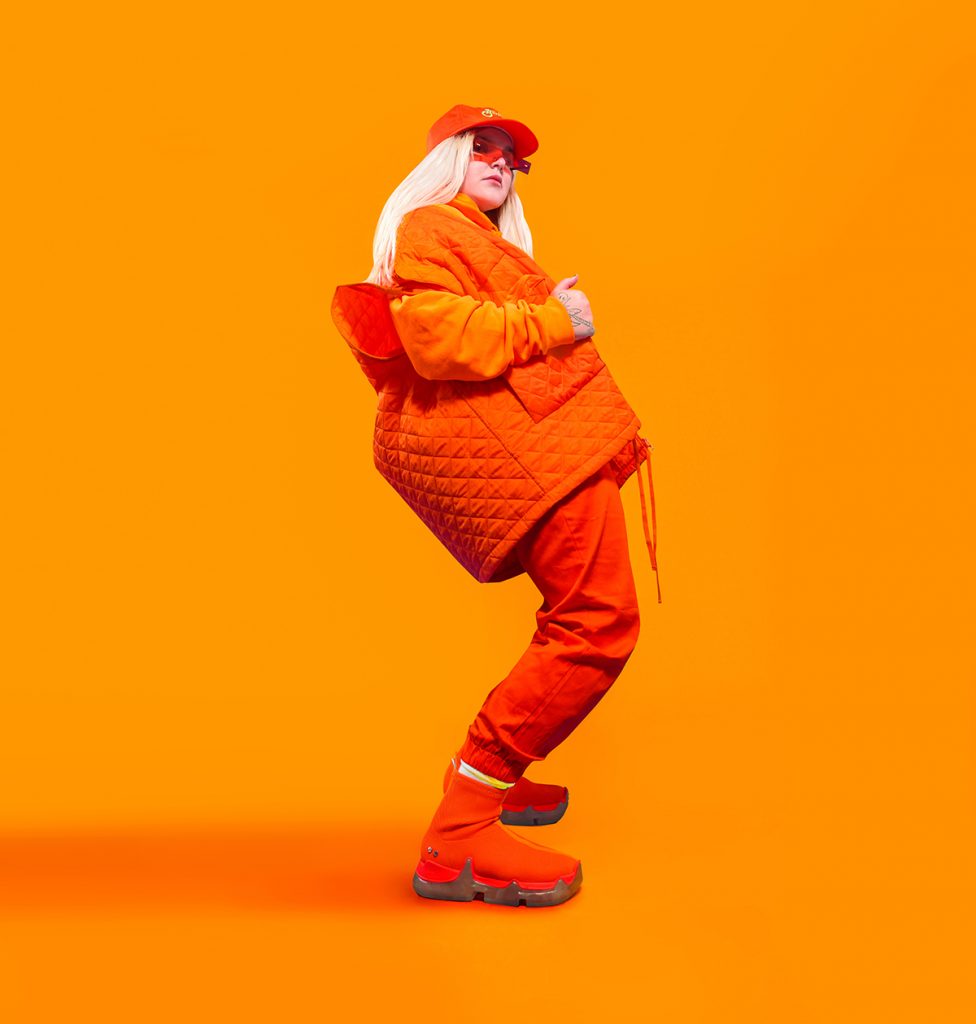
“She took that bad thing, and made it something super positive and very inspiring,” says Kurt, the inspiration behind “Johnny Run Away”. (Photo by Giulia Giannini McGauran (G.G McG) for Rolling Stone)
The fact one of Time’s ‘Most Influential People of 2019’ wants to spend hours with Tones comes as no surprise to the people who know her best. Tones’ friends are her mirror image, not in physical resemblance but in their colloquialisms and body language. I wonder if they synced like this because they met or had they always been kindred spirits.
Kurt, a svelte Melburnian with a calming energy, is telling me what it’s like to be the sole inspiration behind Tones’ debut single “Johnny Run Away”.
“She took that bad thing, and made it something super positive and very inspiring.”
Kurt met Tones in 2012 when he was running the door for Harba Oyster Bar & Grill. The restaurant hosted live music from 8pm on Tuesdays and Kurt was the one who handed Tones, who performed as Toni Watson back then, her $30 cut from door sales. The pair eventually moved in together and worked together at Universal Store. One night at their home, Kurt opened up to Tones in the way only someone who knows their heart is safe can do. He told her of his coming out journey and how it had almost broken him.
“I love that that’s no longer something I associate with myself or what I went through,” he says. “I’ve had people come up to me and say they’ve gone through similar things and it’s really helped them. I wish there was something like that ten years ago for me.”
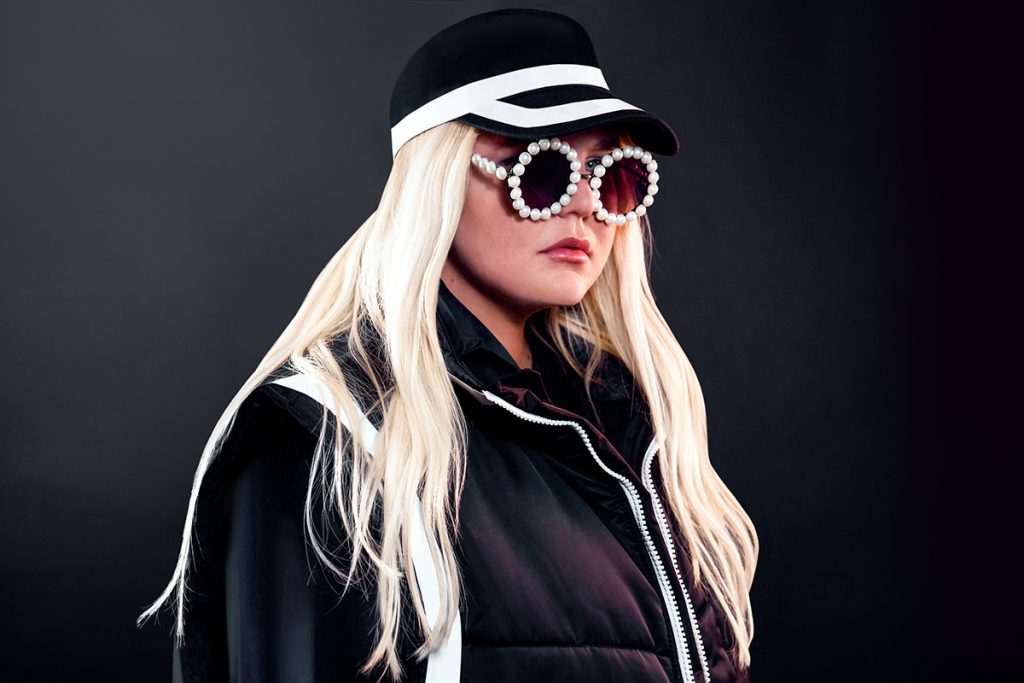
“I’ve had people come up to me and say they’ve gone through similar things and it’s really helped them.” (Photo by Giulia Giannini McGauran (G.G McG) for Rolling Stone)
In December last year Tones hired Kurt and Abbie as her joint personal assistants – but you won’t catch her gushing about how she’s in a position to put her friends on payroll.
“I don’t think it’s ever cool to be the boss of your friends,” says Tones. “[…] They work hard, really hard, and I’ve seen them work hard for years so to be able to give them a job that they deserve, that pays good money and lets them travel and have fun, that’s the best thing ever.”
Abbie offers one of the more telling insights into the psyche and impact of Toni Watson: “She’s not someone to say, ‘You’re a mate, come along for the ride’. She is working hard. She doesn’t give herself the credit of how much she’s influenced other people.”
Tones And I is an iceberg, what you see is not what you get. Her fame does not commensurate her sales. The world is still learning about the sole songwriter behind the world’s biggest, multi-record breaking hit.
Australia is yet to meet the Aussie larrikin who has me in stitches when she tells me her biggest regret is the $900 pair of pants she bought in France (she read the tag wrong) – “Every time I see the pants in my wardrobe I’m like, ‘I’ve never worn you’.”
“Everything is wrong online.”
Instead, there’s a vigilante-esque swath of people trying to figure out her age under the guise of ‘call-out culture’. As Twitter and Reddit threads double over themselves in a vacuum of non-information about exactly how old she is, Tones refuses to engage.
And why should she? The music industry is infamous for the rampant erasure of female artists over 40, so why would Tones essentially place a ‘use-by date’ on herself and fuel her own symbolic annihilation? Not that she cares; the public obsession is just another source of bemusement for her.
“I never denied my age,” she says matter-of-factly. “I never lied about it. I just don’t say anything now because, screw it; now there’s one thing I can have to myself. And I tell you this,” she leans forward. “Everything is wrong online.”
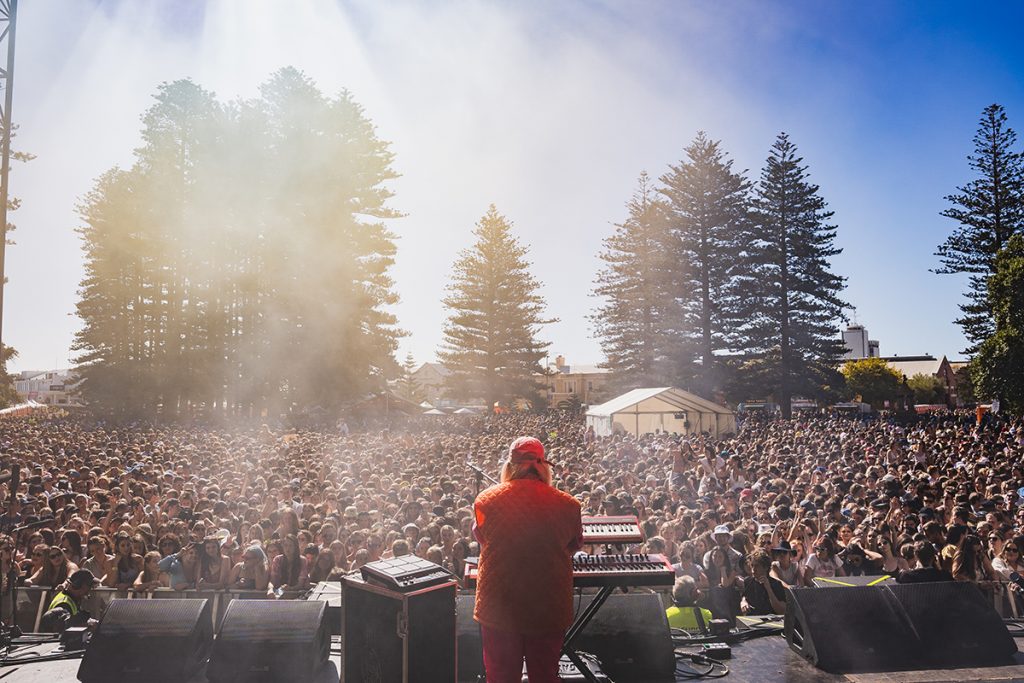
Tones And I live performances have fast become the stuff of legend. (Photo by Jack Neale)
Backstage at Laneway Festival her dressing room is packed. A rep from YouTube just presented her with a plaque for 1 million subscribers, and creative director and photographer GG McG decked out the space top to bottom in graphics. But her fan base is growing at such a rapid pace that it’s old news; she had hit 2 million the week prior; at the end of 2019 she was at 100,000; she’s now at 2.8 million.
As the milestones come in thicker and faster than the time she has to actually celebrate them, Tones’ story refuses to acknowledge the laws of music industry ascent. It should typically go: single, single, EP, maybe another EP, hopefully a hit, global tour, then an album that hits top five if you’re lucky. It could be said that Tones And I is working backwards, building her plane while it’s flying.
As the milestones come in thicker and faster than the time she has to actually celebrate them, Tones’ story refuses to acknowledge the laws of music industry ascent.
It feels radical. There’s a manic energy and excitement surrounding her at all times. In a country where artists are relocating in droves to LA and London in a bid to overcome Australia’s geographic handicap, Tones And I offers a new blueprint for future generations. She represents the possibility of a global career built out of regional Australia, sans a major label record deal and without a stack of co-writers. When it comes to iconic Australian women in pop, Tones And I will eventually be said in the same breath as Sia and Kylie Minogue.
Tones is infatuated with the subversive nature of pop. She has made the decision to not chase fame; instead she wants impact.
Just like Sia, Tones is no pop pushover. The way she refuses to buy into traditional pop star tropes certainly has a lot to do with her success. Music fans are tired of the fat-lipped, thin-hipped White Glo commercials who now make up much of their Instagram feeds. Tones is infatuated with the subversive nature of pop. She has made the decision to not chase fame; instead she wants impact.
At industry conference BIGSOUND last year Tones orchestrated a silent protest. 30 actors gathered at the centre of Brisbane’s Brunswick Street Mall in bespoke Tones And I white tracksuits, each painted repeatedly with the text: ‘the kids are coming’.
She was criticised for not having a clear message that day, however ensuing discussions around racism, LGBTQIA issues, and climate change proved otherwise. She is not your pop idol, she is not yours at all. Her service is to art.
She is not your pop idol, she is not yours at all. Her service is to art.
“This “Dance Monkey” thing is like a blessing and a curse,” she says. “It’s opened me up to so many more fans and to have so many people discover my music, but I don’t want to be known for that until I die. It was one song I wrote,” she says wearily. “It’s not even near my favourite song.”
“[…] The only thing that would make me really excited right now, the one thing that would make me so excited,” she pauses, “is for people to just listen to one of my other songs.”
Tones may have a loaded relationship with fame at this point, but she understands the only thing worse than being targeted for her ubiquity is to have no ubiquity at all. Onstage at Laneway Festival she tells the crowd of her frustration as a punter. She would attend gigs and festivals and watch others live out her destiny: “I used to get so angry because I knew I could do that,” she says from the edge of the stage. It’s the speed at which she’s mounted this current peak that she struggles with.
“My emotions are pretty tame most of the time now,” she tells me, a clear defence mechanism to sublimate her sadness. “It sucks because I think it comes from having so many things happen in such a short amount of time.”
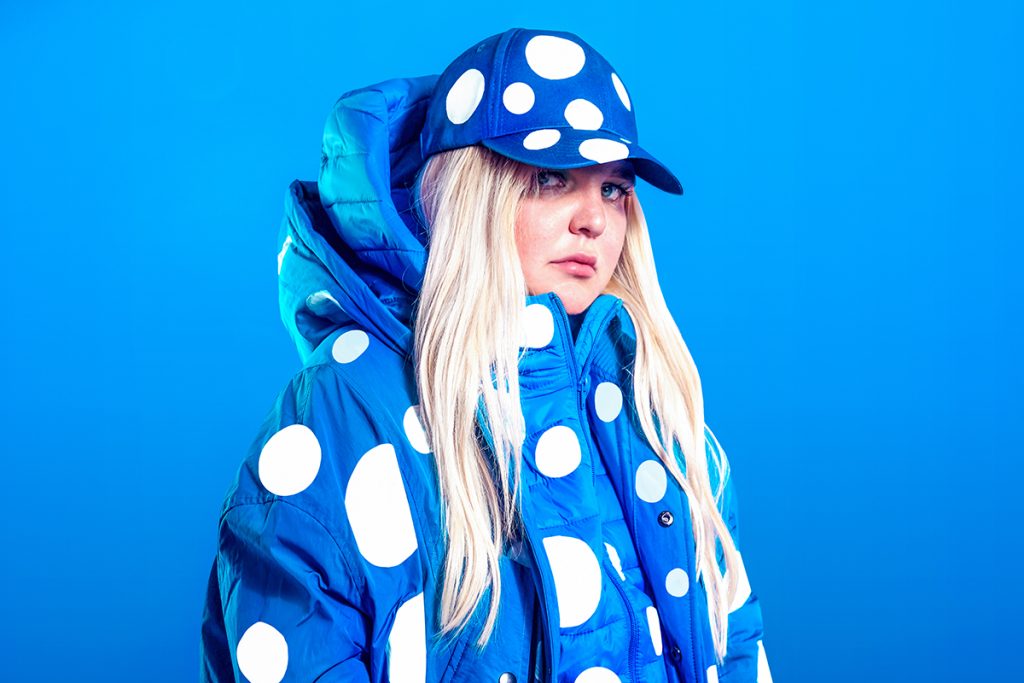
Tones wants to help others learn from her experience. (Photo by Giulia Giannini McGauran (G.G McG) for Rolling Stone)
Tones wants to help others learn from her experience. She believes the privilege of success comes with an unfettered responsibility to support those following in her footsteps. When a 16-year-old George Alice won triple j’s Unearthed High competition last August, Tones called her personally.
“It’s not hard to know that she is probably going to go through a similar thing even with a small amount of success,” she says. “It happens all the time. I don’t want to be seen as someone crumbling and falling. That’s not the case,” she assures. “If I was, I wouldn’t be writing music and going on a world tour.”
It’s during her onstage moments, when it’s just her and the same red keyboard she used while busking, that she feels truly herself. There is an undeniable chemistry between Tones and her fans, the ones who ‘get’ it. When she performs she’s in her element, revelling in her true identity. She’s cheeky, she’s fun, a little sassy even, with the voice and the moves to match.
Charging the festival stage at Laneway, she performs new single “You’re So Fucking Cool” about a party she attended in LA. There are elements of her true self in the music: frustration, longing, loneliness, playfulness. This particular track features the lyrics: “I try to start a conversation but I can’t seem to relate / Yo, I’m about to get an Uber.” Tones doesn’t seem to realise that in these ingenue years, she’s more relatable than ever.
This article originally appeared as the cover feature interview for the debut issue of Rolling Stone Australia. To receive this back issue with the full feature, or to receive every Rolling Stone magazine delivered to your door via an annual subscription, check out our subscription options here.



































